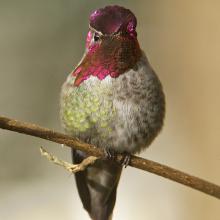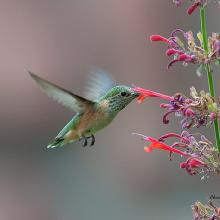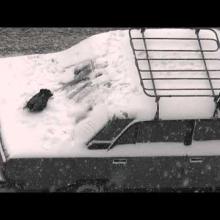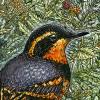

Join BirdNote tomorrow, November 30th!
Illustrator David Sibley and actor H. Jon Benjamin will face off in the bird illustration battle of the century during BirdNote's Year-end Celebration and Auction!
Evolutionary time is long — the earliest ancestors of birds emerged around 50 million years ago. Against that yardstick, the length of time humans have been living in cities is a blip. But that blip has resulted in huge changes for urban birds, crows in particular, as John Marzluff explores in his book, Welcome to Subirdia. “We change climate, we change foods, we change the distribution of habitats,” says Marzluff. “We add new predators; we take away other predators. We bring in competitors . . . It’s a potent selective force on birds.”
BirdNote®
How Humans Affect Competition Among Birds
Written By Dominic Black from an interview with Professor John Marzluff
This is BirdNote.
Evolutionary time is long. Against that yardstick, the length of time humans have been living in cities is a blip. But that blip has had huge consequences for birds, as John Marzluff explores in his book, Welcome to Subirdia.
And so this is a rather novel selective force, but it's a potent selective force on birds.
Marzluff is Professor of Wildlife Science at the University of Washington in Seattle.
We change climate, we change foods, we change the distribution of habitats.
We add new predators; we take away other predators. We bring in competitors. [Crossfade] We re-assort the birds that live together in our cities in ways they haven't been together in the past. Which sometimes makes for uneasy bedfellows…
The Northwestern Crow was the resident crow on the west coast of the US, and the American Crow was more in the East. And because of change in habitat from planting, as well as urbanization in the Midwest, the American Crow came across the US and has colonized the West Coast. And may be genetically swamping the Northwestern Crow.
The Anna's Hummingbird's another example, competing against the native Rufous Hummingbird in the Pacific Northwest. That didn't occur even twenty or thirty years ago. And as a result, the more native Rufous Hummingbird is now dealing with another larger, more aggressive, already-here hummingbird when it arrives from its migratory path down south.
For BirdNote, I'm Mary McCann.
###
The Macaulay Library of Natural Sounds at the Cornell Lab of Ornithology, Ithaca, New York.
BirdNote’s theme music was composed and played by Nancy Rumbel and John Kessler.
Producer: John Kessler
Executive Producer: Dominic Black
© 2015 Tune In to Nature.org April 2017/2019 Narrator: Mary McCann
ID#: marzluffj-subirdia-02-2015-04-14 marzluffj-subirdia-02











